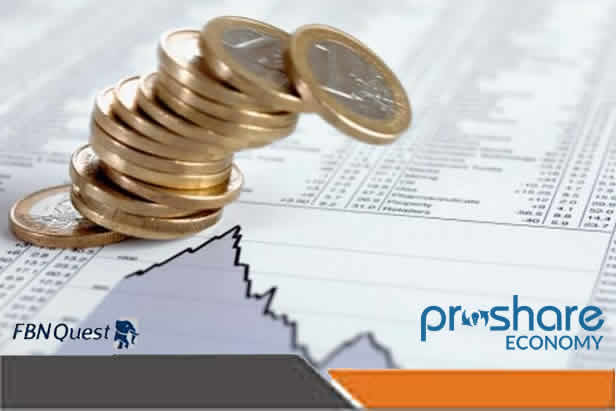Monday, November 28, 2016/11:08 AM /FBNQuest Research
Nigeria’s balance on the current account is highly correlated with its oil exports. Our chart shows that the trade and current accounts move in tandem other than a blip in Q1 2016.
The balance on trade has fallen from a surplus equivalent to 6.8% of GDP in Q2 2012 to a deficit of -1.6% in Q2 this year. Over the same period, the share of oil and gas exports in GDP has plummeted from 20.5% to 7.4%.
The data reinforce the impression that the fall in exports has been more dramatic than that for imports, and underpin the argument for economic diversification.
In Q1 the trade account deteriorated to -1.5% of GDP while the current account balance improved to a small surplus of 1.3%. This departure from the trend was due to the services account, on which the deficit narrowed from -2.6% of GDP to -0.4%.
Two developments explain the anomaly: a credit for communications services of US$2.13bn (compared with just US$22m the previous quarter) and a debit on travel of just US$280bn (compared with US$1.06bn). They can also be seen in the Q2 data, although on a smaller scale.
The inflows on net current transfers, which are not shown in our chart, have ranged between 3.8% and 4.9% of GDP over the four-year period. A decline from 4.8% to 4.3% in Q2 is consistent with anecdotal evidence that remitters are increasingly turning to the parallel market for the greater naira value.
It is clear that, until Nigeria is able finally to diversify its economy, weak oil export revenues generally directly into a current-account deficit, albeit one of manageable proportions..jpg)
We see deficits ahead representing -3.8% of GDP this year and -2.0% next. This is not Ghana nor does it invite comparison with, say, Angola.
Related News
1. NBS Publishes GDP by Expenditure for Q1 and Q2 2016
2. Telecoms Sector Contributes N1,399bn to GDP in Q3'16
3. The 2017-2019 Medium Term Expenditure Framework (MTEF) is Incomplete – BudgIT
4. Five Worst Performing Sectors from Q3'16 National Accounts
5. Nigeria's GDP Declines to -2.24% in Q3'16 from -2.06% in Q2'16; Lower by 0.18%
6. Q3’16 GDP - Few Bright Spots Amidst Further Contraction
7. Assessing the Macroeconomic Direction for 2017
8. The Multiplier Effects of Sabotage
9. CBN Communiqué No. 110 of the MPC Meeting – Nov 21-22, 2016
10. Rewards of fiscal policy in stages
11. Nigeria's GDP Declines to -2.06% in Q2'16 from -0.36% in Q1'16; Lower by 1.70%
12. Nigeria's GDP Declines to -0.36% Negative Growth Rate in Q1'16 from 2.11% in Q4'15
13. Telecoms Sector Contributes 8.88% to GDP in Q4 2015
14. Nigeria’s GDP Grows by 2.11% in Q4’15; Lower by 0.73% from Growth Recorded in Q3’15
15. Telecoms Sector Records 7.71% Contribution to GDP in Q3’15 - NBS
16. The Nigerian Economy: Past, Present and Future - NBS
17. Nigeria GDP grew by 2,84% (y-o-y) in real terms, marginally higher than Q2 ‘15 – Nov 17, 2015
18. Total Expenditure on GDP Increases by 2.30% YoY in Q2 ‘15
19. Nigeria GDP grew by 2,84% (y-o-y) in real terms, marginally higher than Q2 ‘15
20. Nigeria's Real GDP Records 3.96% Growth in Q115; Lower by 11.57% - May 14, 2015
- Read
- Archives
- Bonds & Fixed Income
- Capital Market
- Chamber of Commerce
- Commodities
- Corporate Results
- ETFs
- Forex
- Funds
- General
- Global Market
- Market Updates
- Mergers & Acquisitions
- Mutual Funds
- Private Equity
- Public & Private Offers
- REITs
- Research Resources
- Stock & Analyst Updates
- Stock Picks
- Unlisted OTC MARKET
- Market Sentiments
- Online Trading
- Year After A
- Capital Market Report
- Read
- Personal Finance Series Reports
- Year After Report
- Economic & Financial Reviews
- Impact & Performance Reviews
- Archives
- Products&Services
- Sector Reports
- Quarterly Results
- Taxation
- Mutual Funds
- Monetary Policy
- Proshare Reports
- Power & Energy
- Right Issue Indemnity
- Proshare Analyst Reports
- Insurance
- Private Placements
- Doing Business in Nigeria
- Money Issues
- Regulators
- Fraud & Scandals
- Audited Accounts &Financial Reports
- Proshare Confidential
- Memo to the Market
- Health
- Regulator
- CEO Statement
- Proshare on company
- Online Trading Report
- Agriculture
- Legal Matters & Laws
- Conference Call
- Press Release
- Training
- World of Business
- Bond Market
- Others
- Annual Reports
- Analyst Equity Reports
- Budget
- Nigerian Economy
- Commodities
- Fintech
- Review & OUTLOOKS
- Monthly Market Report
- Oil&Gas
- IR Service Reports
- Public Offers
- Elections
- Education
- IR Presentation
- Analyst Market Reports
- Global Economy
 Lagos, NG • GMT +1
Lagos, NG • GMT +1











 3334 views
3334 views





 Sponsored Ad
Sponsored Ad
 Advertise with Us
Advertise with Us









